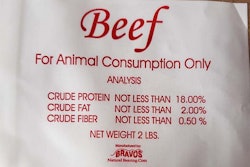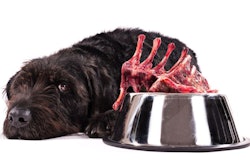
Among dogs diagnosed with canine dilated cardiomyopathy (DCM), veterinary medicine researchers at Tufts University identified a correlation between survival time and changing from a grain-free dog food diet. However, this correlation varied among pets and doesn’t prove a conclusive link between diet and DCM, the scientists wrote in the Journal of Veterinary Medicine.
In a study of 71 dogs’ medical histories, one group of dogs had their diets changed from grain-free formulations to conventional kibble following diagnosis with DCM. Those dogs tended to live longer following the initial manifestation of disease symptoms, compared to dogs that stayed on a grain-free diet. Signs of heart disease also declined on heart monitors, called echocardiograms, compared to readings taken before the diet change. Likewise, dogs that received taurine supplementation during the course of their disease had a significantly longer survival time than those that did not.
Details of research on correlation between DCM and grain-free diet change
The researchers evaluated the case histories of dogs diagnosed with DCM between January 2014 and September 2018. Fifty-six of these dogs primarily ate what the researchers termed non-traditional. The other dog foods eaten by pets in the study were called traditional, as defined below.
Traditional dog foods
- grain-inclusive extruded diets,
- did not contain peas, lentils, or potatoes as in the top 10 ingredients on the ingredient list, and
- manufacturer met the World Small Animal Veterinary Association (WSAVA) Global Nutrition Committee recommendations
Nontraditional
- extruded grain-free diets,
- contained nontraditional ingredients (peas, lentils) as main ingredients, or
- manufacturer did not meet the WSAVA Global Nutrition Committee recommendations
In the nontraditional diet group, 31 out of 56 dogs (55%) had their diets changed after diagnosis. Of the 15 dogs in the traditional diet group, 6 out of 15 (40%) had their diets changed after diagnosis.
During follow-up echocardiography, dogs in the nontraditional diet group that had their diets changed had a significantly larger improvements in two measures of heart health: decreased normalized systolic left ventricular internal dimension nLVIDs and a lower left atrial:aortic ratio, when compared to dogs in the nontraditional diet group that did not have their diets changed. Similarly, dogs that changed from nontraditional to traditional kibble experienced significantly longer survival time. However, overall survival times ranged from 9 to 1,307 days and not all dogs saw improvement after changing diets.
FDA investigation into DCM and grain-free dog food
In July 2018, the U.S. Food and Drug Administration’s (FDA) publicly announced the agency’s investigation into correlations among certain dog foods and DCM. Federal authorities examined reports of DCM in dogs eating certain diets labeled as grain-free, particularly those containing peas, lentils, other legume seeds, or potatoes as main ingredients, which were more common in diets labeled as grain-free. A year later, the agency released data from their investigation that stated 93% of the 524 reported cases of DCM, involved dog foods made with peas and/or lentils, while 90% of the afflicted dogs had eaten diets labeled as grain-free. The FDA named 16 brands most frequently eaten by dogs involved in official reports of DCM. Sales of grain-free dog food in general, and those named brands especially, fell following FDA’s announcements, while more new products began to include taurine. Pet food companies adapted their marketing, while developing new dog foods, treats and toppers specifically meant to ease pet owners fears of DCM. Instead of claiming that all grain in pet foods were negative, brands became “grain friendly” as they began to include ancient grains or other “healthy grains, while continuing to malign conventional grains like wheat and corn.
Although the FDA investigation caused upheaval in the pet food industry, scientists and other involved with the pet food industry have pointed out the lack of direct evidence connecting those grain-free dog foods to DCM, since the first FDA announcement. Likewise, some have criticized the FDA for going public with the investigation before solid evidence existed, especially considering the negative economic consequences for dog food brands.
Canine dilated cardiomyopathy heart disease
DCM affects dogs’ heart muscles. The disease results in an enlarged heart. As the heart and its chambers become dilated, pumping becomes more difficult and heart valves may leak, leading to a buildup of fluids in the chest and abdomen. DCM often results in congestive heart failure. Heart function may improve in cases that are not linked to genetics with appropriate veterinary treatment and dietary modification, if caught early. Breeds that are typically more frequently affected by DCM include large and giant breed dogs, such as Great Danes, Boxers, Newfoundlands, Irish Wolfhounds, Saint Bernards and Doberman Pinschers. It is less common in small and medium breed dogs, except American and English Cocker Spaniels. Cases reported to the FDA included Golden and Labrador Retrievers, Whippets, a Shih Tzu, a Bulldog and Miniature Schnauzers, as well as mixed breeds.

















